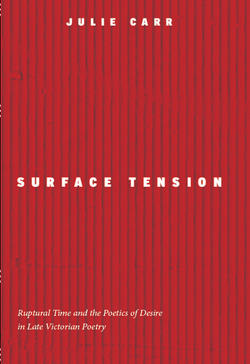Читать книгу Surface Tension - Julie Carr - Страница 5
На сайте Литреса книга снята с продажи.
ОглавлениеPREFACE
In writing this book over many years, my sense of its audience has shifted. As it began as a dissertation, its earliest drafts were intended for a community of scholars, Victorian scholars specifically, and those interested in Victorian poetry even more. But this group, though one I admire from something of a distance, has not become my primary intellectual or creative community. As a poet and a publisher of poetry and innovative fiction and prose, I belong first and last to a community of contemporary writers, of poets. After such a long time of writing, reading, giving readings, teaching, publishing, and curating within this community, it would be impossible, I think, for me to write anything that was not in some sense “for” them, for the poets, which is to say, for my friends. In America’s literary landscape, in English and Creative Writing departments all over the country, there is often a divide between the scholars and the so-called “creative” writers, one that is generally crossed only by critics of contemporary literature. This book is mostly not about contemporary literature, and yet I hope it ventures across that divide anyway, speaking finally to both scholars and poets about a few figures from a hundred and fifty years ago in a way that might be useful, or at least stimulating. For the poets, I hope to bring those nineteenth-century writers in order to expand what we think of as the present. For the scholars, my hope, of course, is that the arguments here will feel interesting and convincing. But I also hope to reveal something about the ways that contemporary poets think about their work, and in so doing to draw a new line of connection between the Victorians and ourselves. This is not a book that mines the archive for new materials, nor is it a book that finds new figures to draw into our canon. However, in that this is a book by a poet, and one that encourages us to open rather than re-inscribe our sense of the period, of periodization in general, I hope it might, in perhaps revealing something new about contemporary poems and poets, help scholars of Victorian poetry to see the familiar in a different light.
For me, this has finally become a book about desire—the desire that reading carries. For me—for all writers, I assume—to read a poem of great complexity, mystery, and passion, like the poems discussed here, is to ignite the desire to write. This is also a book about the desire to convince someone, perhaps myself, of the importance, the value, the necessity of poems, of their ability to answer to crisis, to imagine change, to move toward a future. Finally, the writing of this book is about the desire for a life that continues to think through the language of poetry, which is to say, the language of motion and play, the language of question and suspension, the language of surface and depth.
I have many people to thank. First, as always, my parents—all four of them—whose own lives have been models of engaged passion, of ethically-informed creativity. I owe a huge thanks to Kent Puckett, an exemplary teacher and scholar who brings to his own writing and teaching an enormous amount of pleasure and passion, who gave to me the greatest gift, the gift of attention, and whose capacity for listening I am still trying to emulate. I am grateful also to Steven Goldsmith for his wide-reaching intellect and his patient and unyieldingly clear conversation, and for his friendship. Others at the University of California, Berkeley—Sharon Marcus, Catherine Gallagher, Lyn Hejinian, Kevis Goodman, and Charles Altieri—all provided me with invaluable support and, as importantly, examples of what it might mean to be a scholar in a world that cares little for its scholars, what it might mean to maintain a faith in intellectual curiosity as a high value in and of itself. My colleagues at the University of Colorado: Sue Zemka, William Kuskin, Lori Emerson, and Patrick Greaney especially, have all been a part of this project, directly or indirectly, and I am grateful to all of them for their help, and also for their friendship. Christopher Nealon deserves a special thanks for modeling so beautifully the balancing act that is the life of a “poet scholar,” but also for inspiring me to write as clearly as I can and to care as deeply as I can for my material. Finally, I have other friends to thank who helped me in one way or another through this process: Jessica Fisher, Margaret Ronda, Linda Norton, Jennifer Pap, Noah Eli Gordon, John-Michael Rivera, Jeffrey Robinson, Andrew Zawacki, Andrew Joron, Brian Henry, K.J. Holmes, Rusty Morrison, Laynie Browne: all of these people have provided me with a kind of background of motivation because of my desire to speak with them, to have them hear me, and to hear them as well. What I would do, or who I would be, without these friendships, is impossible to imagine. So I use this opportunity to thank these friends for all of it.
Finally, I dedicated this book to Tim Roberts, for love.
